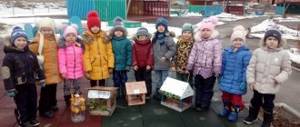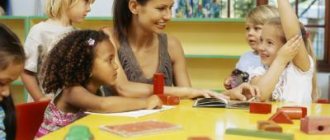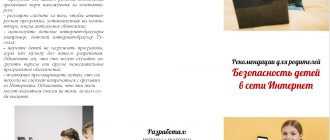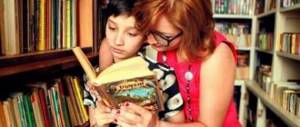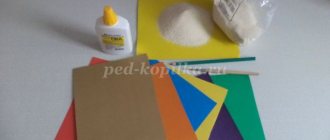Summary of the parent meeting “Children’s health is in our hands”
Only a small number of parents can boast that they have never turned to specialists for medical assistance.
Audio recording of children's answers to the questions: - who is called healthy?
— what should you do to be healthy?
How to improve children's health and avoid diseases? These questions concern both you parents and us, educators, since we all want our children not to get sick, to become healthier and stronger year after year, to grow up and enter a big life not only knowledgeable and educated, but also healthy and seasoned.
Brainstorming “What is health”
— When you entered the kindergarten, your attention was probably immediately attracted by the health stands. So what is health? Assignment for each family (parents' answers).
Educator: Caring for the health of children and adults has become a priority all over the world. This is understandable, since any country needs creative, harmoniously developed, active and healthy individuals.
Caring for raising a healthy child is a priority in the work of our preschool institution. A healthy and developed child has good body resistance to harmful environmental factors and resistance to fatigue, and is socially and physiologically adapted.
In preschool childhood, the foundation of a child’s health is laid, intensive growth and development occurs, basic movements, posture, as well as the necessary skills and habits are formed, basic physical qualities are acquired, character traits are developed, without which a healthy lifestyle is impossible.
The increase in the number of diseases is associated not only with the socio-ecological situation, but also with the very lifestyle of the child’s family, which largely depends on family traditions and the nature of the motor regime. Today it is important for us, adults, to form and maintain an interest in health improvement, both for ourselves and for our children.
So what can adults do to encourage children to adopt a healthy lifestyle? We will try to find out this during our meeting.
At the beginning of our conversation I would like to speculate a little. Let's answer one seemingly very simple question: “Who is a healthy person?”
(parents' answers)
1.What can parents do to introduce their children to a healthy lifestyle? (parents' statements)
2. Assignment: parents go to the board and fill out the table.
Lifestyle, behavior, actions of a child that are detrimental to his health.
(In the evenings he goes to bed late, i.e. lack of sleep, watches a lot of TV, plays on the computer for a long time, does not follow a daily routine, bad habits, unhealthy diet (chips, Coca-Cola...)
Parent meeting “The health of the child is in our hands!”
Municipal budgetary preschool educational institution
kindergarten No. 10 “Lazorik”
Parent meeting
For parents
young children.
Educator: S.I.Shavlova
Target:
- To acquaint parents of pupils with the main factors that contribute to strengthening and maintaining the health of a preschooler.
Tasks:
- Introduce parents to factors that can adversely affect the health of children.
- Encourage parents to take responsibility for their child’s health.
- Motivate for a healthy lifestyle.
Progress of the event:
1. Preparatory stage.
- Conducting an analysis of the pupil's health status by the head nurse of a preschool institution.
- Conversation with parents on the topic “Conditions for a healthy lifestyle in the family.”
2. Organizational stage.
Educators communicate the topic, purpose, and objectives of the meeting.
3. Main stage.
Educator:
"Hello!" - a person says this word every day! This is how the day begins. This is a simple word, but how joyful it is. Just one word brings a smile to everyone’s face. And what does the word “Hello” mean to you, dear parents?
Parents, passing the microphone, name associations for the word “Hello.”
Educator:
The health of children and their development is one of the main problems of families and preschool institutions. A healthy and developed child has good body resistance to harmful environmental factors and resistance to fatigue, and is socially and physiologically adapted. In preschool childhood, the foundation of a child’s health is laid, basic movements, posture, as well as the necessary skills and habits are formed, basic physical qualities are acquired, and character traits are developed, without which a healthy lifestyle is impossible.
Educator:
There are many factors that influence a child’s health, these are:
- Healthcare development -10%
- Ecology - 20%
- Heredity - 20%
- Lifestyle - 50%
Educator:
“Healthy lifestyle?”, your understanding?
Parents' answers.
Educator:
What should you do to be healthy?
Parents' answers.
Educator:
It’s absolutely true that in order to be healthy you need to follow a daily routine, eat right, be in the fresh air, strengthen your body, sleep at least 7-8 hours a day, exercise, alternate activities, etc. A favorable psychological environment in the family is very important .
Educator:
The daily routine
is the optimally combined periods of wakefulness and sleep for children during the day. It satisfies their needs for food, activity, rest, physical activity, etc. The regime disciplines children and accustoms them to a certain rhythm.
Educator:
Proper nutrition
- inclusion of foods in the diet. Rich in vitamins A, B.C and D, mineral salts (calcium, phosphorus, magnesium, copper). And also protein. All dishes for children are preferably prepared from natural products, unrefined, without additives, spices or preservatives. It is important to follow a diet - maintaining intervals between meals.
Educator:
Walking
is the most effective form of relaxation. Helps increase the body's resistance and hardens it. After an active walk, the child’s appetite and sleep always normalize. The walk should be carried out in any weather, with the exception of unfavorable conditions. At the same time, clothing and shoes must comply with the weather and all hygiene requirements. During a walk, a child should not be in a monotonous position, so it is necessary to change their type of activity and place of play.
Educator:
Physical exercises
improve performance, increase physical qualities, stimulate metabolism and the functioning of various body systems. In addition to promoting health and a useful set of physical exercises, physical exercise expands communication and gives new knowledge about yourself and your body. In preschool age, the main task of physical exercise is to improve children’s natural movements such as: walking, running,
jumping, throwing, balancing movements, etc. Walking and running protect the human body from the occurrence of diseases.
Educator:
Favorable psychological environment in the family -
good friendly relationships, trust and mutual understanding, the desire to share your problems with loved ones, the opportunity to find support and help, spending leisure time together. Avoid family scenes and noisy fights in the presence of a child. This is very scary for the baby. If you don’t get along for any reason, find an opportunity to resolve the issues that have arisen one-on-one; and if this is not possible, at least do not raise your voice when discussing problems that have arisen and do not wave your arms. In families where this rule is neglected, children grow up scared and nervous. It happens that logoneurosis also joins. And then the parents do not hide their surprise that their child stutters.
Educator:
Hardening is
increasing the body’s resistance to the adverse effects of a number of environmental factors through systematic short-term exposure to the same factors in a small dose.
Speech by a senior nurse about hardening methods.
4. Practical stage.
Parents are invited to participate in the quiz.
Educator:
Which plants containing vitamin C help against colds?
(Currant, rosehip)
Educator:
Black currant and rose hips increase the body's resistance to cold and ARVI.
Educator:
Which vegetable is rich in vitamin A?
(Carrot)
Teacher:
Carrots increase the body's resistance to diseases of the upper respiratory tract and lungs.
Educator:
Which vegetables contain a natural antibiotic - allicin, which destroys pathogenic microbes without harming bacteria friendly to our body.
(Garlic, radishes, onions).
Educator:
What sweets are good for children? (honey, marmalade, marshmallows, dried fruits, popcorn).
In honey
contains the vitamins, minerals and amino acids the body needs. 100 g of honey contains the daily requirement of magnesium, manganese and iron. And in winter it helps fight colds.
In marmalade
contains a natural component pectin, which gives it a jelly-like shape. It lowers cholesterol levels, removes toxins and normalizes the activity of the gastrointestinal tract.
In marshmallows
contains a lot of iron and phosphorus, as well as proteins, which serve as building materials for muscle tissue.
Dried fruits
– during the drying process, water and vitamins C and A are removed from the fruit. But calcium, sodium, magnesium, and iron remain. And after water is removed, the concentration of trace elements increases.
In popcorn
a lot of fiber, which swells in the stomach, causing a feeling of fullness. But it's better to make popcorn at home to control the salt content.
Educator:
Harm is caused by harmful inclinations of parents. Children of smoking fathers and mothers suffer from bronchopulmonary diseases much more often than children of non-smokers. Even if you try to smoke away from the child - in the kitchen near the window, in the bathroom or in the hallway, some of the smoke still penetrates into the children's room. In practice, it often happens that the child is present near the mother while she smokes. In this case, the child is a so-called passive smoker. The mother's hair and skin also absorb the smell of nicotine; when hugging the child, remember that the child is inhaling a dangerous poison! In addition, such children are somewhat behind in mental and physical development, their sleep is disturbed, they are more capricious and irritable.
Smoking adversely affects the process of formation and development of the neural tube in the fetus, leading to the birth of anencephals, babies with congenital anomalies of mental development, with a cleft palate and cleft lip, inguinal hernia, and strabismus.
A child feels bad when his parents drink in his presence. Not surprising,
that in such families the children are sick, nervous, intimidated, and poorly developed mentally and physically. Many parents would rather spend the weekend drinking a bottle of beer and watching TV than spending time with their child.
Educator:
Injuries and accidents have serious consequences for a child’s health.
What in the home environment can pose a danger to a child’s life? (Parents' answers)
Educator:
Children are very inquisitive and try to imitate adults in everything. They can turn on electric heating devices and like to play with small objects, especially bright and shiny ones (rings, buttons, pins). Sometimes they are sucked. They stick it in the nose, ear, and swallow. And often foreign bodies enter the respiratory tract (seeds, nuts, coins), causing a threat to the child’s life. Medicines left in plain sight are also dangerous. Therefore, parents should:
- Constantly monitor your child’s actions and tell them what and where is dangerous.
- Store jewelry, cosmetics, medicines, hot pots, chemicals and detergents in special places.
- Close windows and balconies.
- Prohibit your child from putting coins, buttons, or sucking fingers in his mouth.
5. Summing up the results of the parent meeting.
Educator:
Remember: the child’s health is in our hands!
Making a decision at the meeting.
Parents express their opinions about the parent meeting and their wishes.
Literature:
Evdokimova N.V., Dodokina N.V., Kudryavtseva E.A. Kindergarten and family: methods of working with parents: A manual for teachers and parents. M.: Mozaika-Sintez, 2007.
Chirkova S.V. Parent meetings in kindergarten / Author-comp. S.V. Chirkova.- M.: VAKO, 2009.-320 p. – (Preschoolers: we teach, develop, educate).
Child health and development: what is important
We strive so hard to raise our children smart and talented that sometimes we forget that this is not the main thing. The main thing is health. And this is where you need to “dance” Before loading your child with circles, sections, developmental clubs, think about whether all this is really necessary. No, not for you. Namely, a child. Maybe he will grow up happier and more successful if he doesn’t spend the entire summer vacation cramming multiplication tables, fractions and reading 300 pages a month. Does he need it? After all, there is fresh air all around, the sun (which, by the way, does not spoil us with its presence very often), friends, communication, football, hide and seek and what else.
Let's let the children enjoy their childhood and summer. Well, how much of life is there for even at an early age to live according to a schedule and always think only about the fact that you owe something to someone. There will still be adult life with its own limitations and boundaries, there will be the word “must” and there will be a sea of responsibility. For yourself, for your family, for your children. Therefore, there must be a time when everything is carefree and rosy. And this does not mean that we will have egoists and loafers who cannot and do not want to do anything.
Believe me, our children are born smarter than you and me. This is the generation now. They know exactly what they want and will definitely achieve it. Talk to your child, just take a break from all your business and worries and sit next to him. Talk like you would to your best friend. You will be surprised how deep their thoughts and reasoning can be. They understand everything, they know that they must learn and that the world is not an endless holiday. And everything will only be fine for them.
